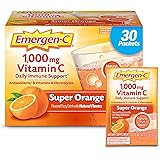Emergen-C 1000mg Vitamin C Powder for Daily Immune Support Caffeine Free Vitamin C Supplements with Zinc and Manganese, B Vitamins and Electrolytes, Super Orange Flavor - 30 Count
$12.79 (as of February 28, 2026 22:41 GMT +00:00 - More infoProduct prices and availability are accurate as of the date/time indicated and are subject to change. Any price and availability information displayed on [relevant Amazon Site(s), as applicable] at the time of purchase will apply to the purchase of this product.)Respiratory drugs are a broad category of medications designed to treat, manage, and alleviate symptoms associated with disorders of the respiratory system. These conditions can range from chronic diseases like asthma and chronic obstructive pulmonary disease (COPD) to acute conditions such as respiratory infections and allergic reactions. The main goal of respiratory drugs is to improve breathing, reduce inflammation and congestion in the airways, and address underlying issues that contribute to respiratory distress.
There are several types of respiratory drugs, each targeting different aspects of respiratory health. Bronchodilators, for instance, work by relaxing the muscles around the airways, helping to open them up and make breathing easier. These are commonly used in conditions like asthma and COPD where airway constriction is a major issue. Anti-inflammatory drugs, on the other hand, aim to reduce swelling and irritation in the airways, and are crucial in managing chronic respiratory conditions. Antihistamines and decongestants are also important, particularly for managing symptoms related to allergies and upper respiratory infections.
In addition to these, there are also medications designed to thin and clear mucus from the airways, helping to prevent blockages and reduce the risk of infections. These are particularly useful in conditions like bronchitis and cystic fibrosis where mucus production is a significant problem. It’s important for individuals with respiratory conditions to work closely with their healthcare providers to determine the most appropriate medication regimen for their specific needs, as the right combination of drugs can significantly improve quality of life and reduce the risk of complications.
Some of the generic drugs commonly used in this category include albuterol, a bronchodilator; fluticasone and budesonide, which are inhaled corticosteroids; salmeterol, a long-acting bronchodilator; and ipratropium, an anticholinergic bronchodilator. These medications are often used in combination to provide comprehensive management of respiratory conditions, helping to reduce symptoms, improve lung function, and enhance overall respiratory health.



